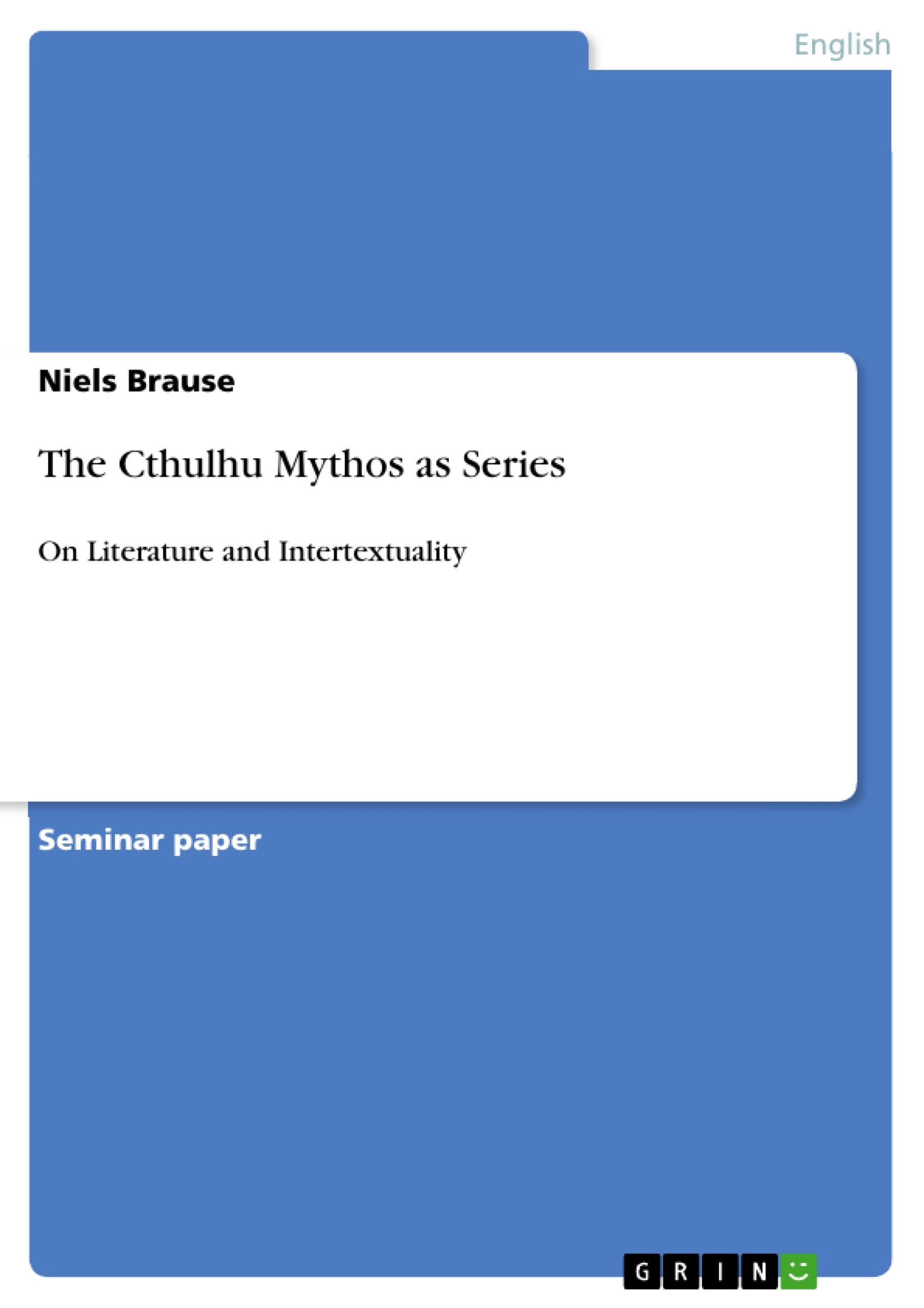This work focuses on the Cthulhu, a word invented by H. P. Lovecraft and a puzzling sequence of letters that has influenced many works of modern pop culture but is still unfamiliar to most.
This Cthulhu Mythos and the question of the extent to which it can be considered as a series is going to be the object of this work. Over the course of the argumentation this text is going to give a brief overview of the term "intertextuality" in the context of literary studies and establish some useful terms for the analysis of Mythos Literature. Subsequently, a definition of "series" is going to be decided on, as well as the characteristic features of so-called Mythos literature. The theoretical results of these three Chapters are then going to be used in an analysis of a short story of contemporary author Neil Gaiman that employs many of Lovecraft’s inventions and concepts. Thence will be answered the question whether or not Neil Gaiman’s "A Study in Emerald" can be considered to be part of the Cthulhu Mythos.
Howard Phillips Lovecraft, born on August 20, 1890, in Providence, Rhode Island wrote more than sixty stories, most of them short, in his forty-seven years lifespan. His work was almost exclusively published in amateur magazines like "The United Amateur", 6 stories between 1915-1923, and the pulp magazine "Weird Tales", 40 stories from 1925 on until 1941 even after his death. It was also in "Weird Tales" that he published probably his most influential short story "The Call of Cthulhu" which centres around the name-giving deity for his overall Mythos.
Inhaltsverzeichnis (Table of Contents)
- INTRODUCTION
- INTERTEXTUALITY IN THE CONTEXT OF SERIES
- A DEFINITION OF SERIES
- ABOUT THE CTHULHU MYTHOS
- IS NEIL GAIMAN'S A STUDY IN EMERALD PART OF THE CTHULHU MYTHOS?
- CONCLUSION
Zielsetzung und Themenschwerpunkte (Objectives and Key Themes)
This work aims to explore the concept of the Cthulhu Mythos and its connection to the genre of series. The text examines the origins of the Mythos, its intertextuality, and the question of whether a contemporary story by Neil Gaiman can be considered part of this established literary universe.
- The definition and characteristics of a series in literature
- The concept of intertextuality and its relevance to the Cthulhu Mythos
- The origins and development of the Cthulhu Mythos, particularly the work of H.P. Lovecraft
- The influence of the Cthulhu Mythos on various forms of media, including film, games, and comics
- An analysis of Neil Gaiman's short story "A Study in Emerald" and its relation to the Cthulhu Mythos
Zusammenfassung der Kapitel (Chapter Summaries)
- The introduction delves into the intriguing world of the Cthulhu Mythos, its creator H.P. Lovecraft, and the impact of his work on popular culture. It highlights the lasting influence of Lovecraft's ideas and inventions, particularly the concept of "cosmic horror" and the fictional book "Necronomicon," which have permeated various forms of media.
- Chapter 2 provides an overview of the literary theory of intertextuality, emphasizing its importance in understanding the relationship between texts and their connection to broader cultural contexts. It explores different interpretations of intertextuality and its application to the analysis of Mythos literature.
- Chapter 3 focuses on defining the term "series" in literature, aiming to establish a framework for analyzing the Cthulhu Mythos as a potential series. It examines the characteristics of series and how these characteristics relate to the works inspired by Lovecraft.
- Chapter 4 explores the origins and key features of the Cthulhu Mythos, delving into Lovecraft's life and work. It examines the various aspects of the Mythos, including its themes, characters, and recurring motifs, providing a comprehensive understanding of this literary universe.
Schlüsselwörter (Keywords)
The main keywords and focus topics of this work include: Cthulhu Mythos, intertextuality, series, H.P. Lovecraft, cosmic horror, Neil Gaiman, A Study in Emerald, Necronomicon, Mythos literature, literary analysis, series definition, cultural influence, and contemporary adaptations.
Frequently Asked Questions
What is the Cthulhu Mythos?
The Cthulhu Mythos is a shared fictional universe originating from the works of H.P. Lovecraft, characterized by "cosmic horror" and ancient, powerful deities like Cthulhu.
Can the Cthulhu Mythos be considered a literary series?
The paper explores this question by defining "series" and analyzing how recurring themes, characters, and the fictional "Necronomicon" link disparate stories into a cohesive mythos.
How does Neil Gaiman relate to Lovecraft's work?
The paper analyzes Neil Gaiman’s story "A Study in Emerald," which blends the worlds of Sherlock Holmes and Lovecraft, to determine if it fits within the Cthulhu Mythos through intertextuality.
What is "cosmic horror"?
Cosmic horror is a subgenre of horror fiction that emphasizes the insignificance of humanity in the face of vast, indifferent, and ancient cosmic entities.
Who was H.P. Lovecraft?
H.P. Lovecraft (1890–1937) was an American author of weird fiction whose short stories, such as "The Call of Cthulhu," became the foundation for modern horror pop culture.
- Citation du texte
- Niels Brause (Auteur), 2018, The Cthulhu Mythos as Series, Munich, GRIN Verlag, https://www.grin.com/document/476848



